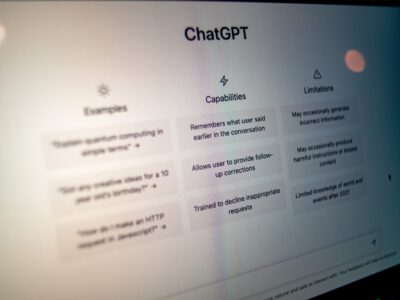I, Artist: New Developments in the Copyrightability of AI-Generated Works
May 30, 2023
By R. Benjamin Peeler, IV
Typically, copyright registration can extend to any “works of original authorship fixed in any tangible medium of expression.” While it has traditionally been clear whether a work of original authorship is eligible to receive copyright protection, recent advances in technology have allowed computers—not humans—to create things traditionally understood to be “works.” This has raised many questions among legal experts and artists as to what exactly it means to be an “author” under copyright law.
On March 16, 2023, the U.S. Copyright Office (USCO) published a new statement of policy on “Works Containing Material Generated by Artificial Intelligence.” The statement follows several recent cases that have sought to establish the limits of copyright protection for works generated solely or in part by artificial intelligence (AI).
Most recently, the USCO refused to grant copyright registration to AI-generated images included in the graphic novel Zarya of the Dawn, instead only recognizing a protectable copyright in the novel’s text, which was written by a human. The USCO explained that “the text of the graphic novel ‘as well as the selection, coordination, and arrangement of the Work’s written and visual elements’ are protectable under copyright law,” but that the images themselves were not. Another case involving a visual work brought by Stephen Thaler, who has also famously attempted to patent AI-generated inventions, was denied registration outright by the USCO, which held that the work in question (pictured below) was made “without any creative contribution from a human actor.”

Credit: A Recent Entrance to Paradise, by DABUS
According to the new statement of policy, the USCO is increasingly being asked to review works created by “generative AI,” which are computer programs trained to create “original” images by pulling from large data sets based on prompts from humans. In addition to the cases discussed above, the USCO said it has also received “applications that have named AI technology as the author or co-author of the work or have included statements in the ‘Author Created’ or ‘Note to Copyright Office’ sections of the application indicating that the work was produced by or with the assistance of AI” and that “[o]ther applicants have not disclosed the inclusion of AI-generated material but have mentioned the names of AI technologies in the title of the work or the ‘acknowledgments’ section of the deposit.” The statement also indicates the USCO has “launched an agency-wide initiative” to examine the many issues raised by AI- generated works with an aim to publish a notice of inquiry seeking public input later in the year.
The Policy
The USCO’s statement of policy firmly excludes non-humans from consideration as authors. The USCO cited various Supreme Court and federal appellate court rulings denying attempts to register works “created” by animals and “non-human spiritual beings” in support of its policy. With those cases in mind, as well as its own Compendium of Copyright Office Practices, the USCO explained that it will use the following procedure when reviewing works involving AI or computer authors:
First, the USCO will ask “whether the ‘work’ is basically one of human authorship, with the computer [or other device] merely being an assisting instrument, or whether the traditional elements of authorship in the work (literary, artistic, or musical expression or elements of selection, arrangement, etc.) were actually conceived and executed not by man but by a machine.” If a work contains AI-generated material, the USCO will consider “whether the AI contributions are the result of ‘mechanical reproduction’ or instead represent an author’s ‘own original mental conception, to which [the author] gave visible form.’” However, if “[b]ased on the Office’s understanding of the generative AI technologies currently available, users do not exercise ultimate creative control over how such systems interpret prompts and generate material,” the work will not be registered. The USCO listed ChatGPT and Midjourney as examples of such machines.
In the case where an artist has modified material originally generated by AI technology to such a degree that the modifications meet the standard for copyright protection, the USCO will grant registration. Additionally, if there is sufficient human authorship to support registration alongside AI-generated elements, the work is protectable. “For example, a human may select or arrange AI-generated material in a sufficiently creative way that ‘the resulting work as a whole constitutes an original work of authorship.’ In these cases, copyright will only extend to the human-authored aspects of the work, which are ‘independent of’ and do ‘not affect’ the copyright status of the AI-generated material itself.” The USCO was also careful to explain that its policy in no way means that AI tools cannot be used in creating original works. Using the example of Adobe Photoshop for editing images, the USCO has long-awarded copyright protection to works created with the help of sophisticated technological tools. In each case, “what matters is the extent to which the human had creative control over the work’s expression and ‘actually formed’ the traditional elements of authorship,” according to the USCO statement.
Furthermore, the USCO clarified that applicants have a duty to disclose the use of AI tools in the creation of their works, to exclude AI-generated content of any significance, and to provide an explanation of the human author’s contribution. “Applicants should not list an AI technology or the company that provided it as an author or co-author simply because they used it when creating their work,” said the statement. Failure to do so may ultimately result in cancellation of the registration.
Ben Peeler is an associate attorney with Flint, Connolly, & Walker, LLP who represents clients in a variety of intellectual property and corporate matters. If you are interested in learning more about the legal ramifications of AI’s impact on art, or if you are seeking to register a copyright, patent, or trademark, contact Flint, Connolly, & Walker for a consultation.

